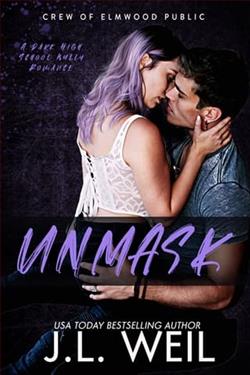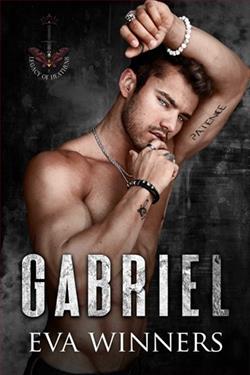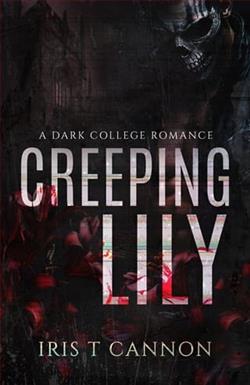Page 27 of Seven Percent of Ro Devereux
It’s slippery, Dad would always say.There’s algae and uneven surfaces and sharp metal and even the water can change on you, Ro. You can get pulled under before you know what’s happening.
Sounded fake to me. It was just the stupid dam, the same one Miller and I walked the edge of nearly every summer day all our lives. I wrote it off as an adult worry, one that didn’t apply to me—I knew the dam differently than Dad, always cooped up in his coffee shop. I was out there all the time. The dam was part of my world, not his. That big hunk of sloping concrete and I had an understanding, I thought.
It was early August, and Miller and I had backpacks full of sunscreen and chip bags and plastic-wrapped sandwiches from Vera’s house. I could feel my walkie at the bottom of the bag, hitting my spine when I stood up to pedal. We carried the walkie-talkies with us everywhere: a set Dad had gotten me years before with a range big enough to span from my bedroom to Miller’s.Miller, I’d asked him that morning.Do you copy? Let’s bike to the lake, over.I loved that crackle of static before he answered:Ro, I copy. Meet at your driveway in five. Over and out.
I was wearing my swimsuit under my shorts and Miller had a baseball cap on, brilliant red with the Captain America logo. I could feel a sunburn starting on my shoulders, on either side of the thin swimsuit straps.
Race you up the hill, I shouted, which is the last thing Iremember saying. We’d biked the thin edge of the dam reservoir and now I was pedaling uphill, grinding into my lowest gear as my fat bike tires yanked over uneven tufts of grass. We should’ve just walked it, like we usually did. It was too steep to bike, too close to the edge of the dam.
Miller yelled my name before it happened, like he knew. The whole thing spiraled at the warp speed of a car wreck, too fast to process. I was on my bike and then I wasn’t, and I was falling until I stopped, and the pain exploded from my arm like something superhuman, too big to contain in my body. I don’t think I screamed; in my memory the entire thing is empty, shock-wave silent.
When I opened my eyes there was just blue sky above me. Endless and Colorado-cloudless. The pain was too big to breathe through, absolutely too big to speak through. Miller’s face appeared above mine, his mouth moving to form words I couldn’t hear. I remember thinking his eyes matched the sky perfectly, that I’d have to tell him when I remembered how to talk. I remember that he looked terrified, which registered somewhere as a very big problem. When Miller was scared, I was supposed to be scared, too.
Later, he told me that it was my backpack that stopped the fall: one strap caught on the jut of the dam’s concrete lip, interrupting my trajectory. Without it, who knows. My skull might’ve cracked against the floor of the dam, my brains flowing with the rest of the lake down the stream into town. That didn’t happen, but as I fell my left arm caught an exposed thorn of rebar, rusted andvicious as a claw breaching the dam wall. It twisted open a gash from my lower bicep to the outer edge of my wrist. Miller told me he was sure I’d die, that he didn’t know a body could hold so much blood.
And somehow, still, he shimmied the for-emergencies-only cell phone from my shorts pocket and called 911. He was eleven. We were stupid kids. If our roles were reversed, I would have called his mother if I called anyone at all. I would have let the panic eat me alive.
In the hospital, they pumped me full of tetanus vaccine and sewed the unpeeled pieces of my arm back together. I remember almost none of it, just flitting in and out of sleep to find Vera next to me, or my dad. I was in the ICU for two days, and when I came home Miller and Willow were waiting there with cookies and cartons of ice cream and a thick stack of DVDs that Miller and I spent the last week of summer watching in my living room. I was groggy and drug-addled, my arm always elevated on a pillow between us. I was bad company, probably, but Miller never left.
“Now you’re like Odysseus,” he told me the third day I was home. “With his scar from the boar fight.” He hovered a pale hand over the Frankenstein mess of my arm, the long gash angry with stitches.
“Even if you’re old,” he said. “Even if you’re different. Now I’ll always be able to find you.”
That’s what I’m thinking about the next morning as a producer fromRocky Mountain Liveclips a mic to my shirt. Abouteleven-year-old Miller, and ten-year-old me, and the carnage of my arm that didn’t keep us together after all.
The producer steps back and Felix moves in, adjusting the clasp of my necklace out of sight and straightening the hem of my button-down. I have the sleeves rolled up my forearms and his fingers linger there, where the skin is carved silver and sensitive.
“What happened here, sweetie?”
We lock eyes, his perfectly lined and mascaraed. “Gnarly fall,” I tell him.
Miller is within easy hearing distance, but when I glance over he’s fiddling with his mic and doesn’t acknowledge us. Felix has him dressed better than he ever is otherwise: navy chinos and brown leather shoes and a patterned shirt. I start to unroll my sleeve.
“Don’t,” Felix says, laying his hand on my arm. “We don’t need to hide that.”
I don’t tell him that I wish we could. That the memory of Miller is eclipse-hot and impossible to look at. That in every moment that’s passed since the Fast Freeze, there’s been no room for anything between us except hatred.
After breaking our unspoken pact of silence about what happened freshman year, the polite distance that Miller and I achieved since matching is gone. He drove me home from the Fast Freeze wordlessly, turning up the radio so loud that it echoed in my skull even after I was home. I lay in my bathtub with my ears underwater for an hour, replaying our fight until all the words bled together but I was surer than ever that he was wrong. Thathedidn’t accept my apology, thatheremoved himself from my life, thathechose this hateful space we live in now.
How could you possibly have thought that?he’d asked. And I thought,How could I possibly have thought anything else?
After a lifetime of sharing everything, Miller had chosen not to share my shame. Not to make space for that cowardly person inside me who spent a week crying into his voice mail. Miller had watched me wheedle for his own mother’s affection from the moment mine left. Miller had pulled me bleeding from the Gossamer Lake dam. Miller had been there for every ugly, awful thing. But when we were fifteen, I made a mistake and Miller decided the relief of being free of me was finally bigger than the pain of losing me.
Miller picked that. And, like so many times before, picking it for himself meant he was picking it for both of us.
“Ro. Miller.”
We look up in unison, and a guy in a headset waves to us through the doorframe. “Showtime.”
16
“Ro Devereux and Alistair Miller.” Ruby Chakrabarti is wearing a powder-blue dress and a million-dollar smile. “I’m so excited to have you here this morning onRocky Mountain Live.”
Miller beats me to the punch, punctual little teacher’s pet that he is. “We’re excited to be here, Ruby.”
I bite the insides of my cheeks and smile, blinking into the stage lights. It’s about two hundred degrees up here, Miller and me on a small couch across a coffee table from Ruby. There’s a solid foot of space between us, and his hands are folded in his lap.
“Ro and Miller are seniors at Switchback Ridge High School,” Ruby tells the camera. From where I’m sitting, I can see the words scrolling on her teleprompter. “But they’re also the faces of MASH: a new app that predicts users’ futures through a behavioral science survey. By telling you where you’ll live, what you’ll do for work, how many kids you’ll have, and who your partner will be, MASH takes the guesswork out of modern life. And with MASHmatching having just launched a few weeks ago, Ro and Miller here are—dare we say it?—a match made in... algorithm.”















